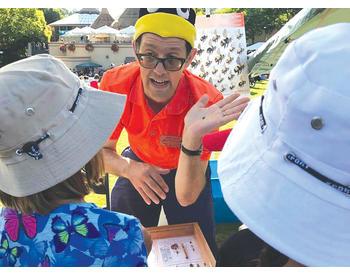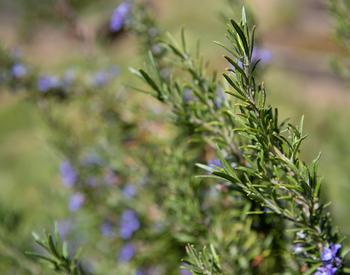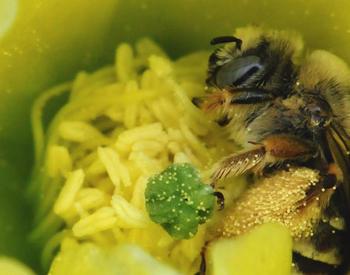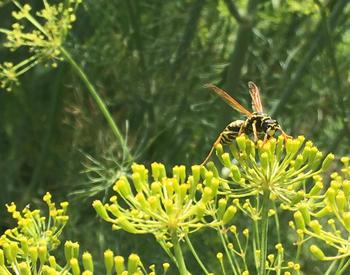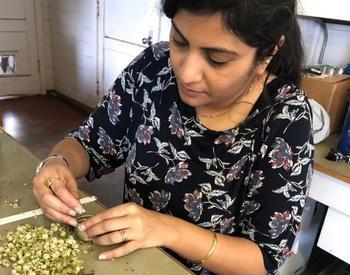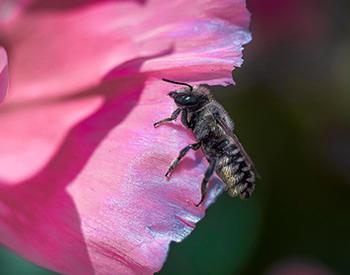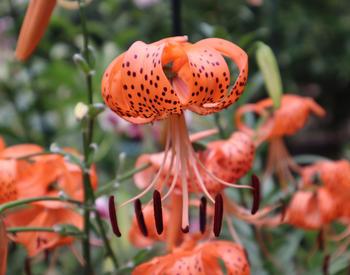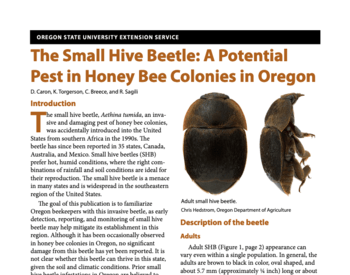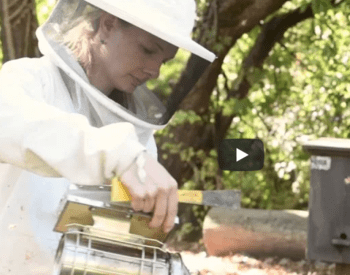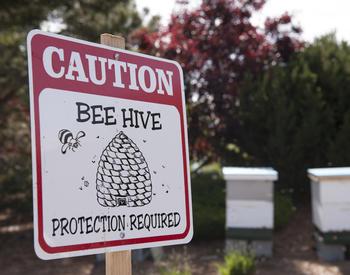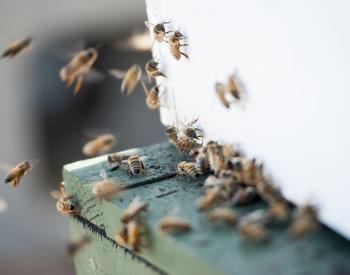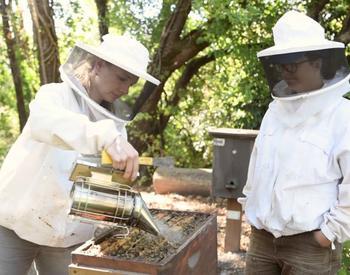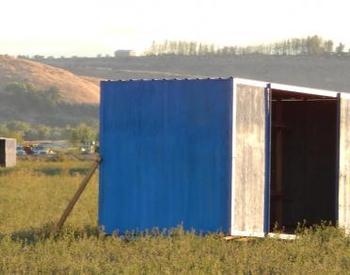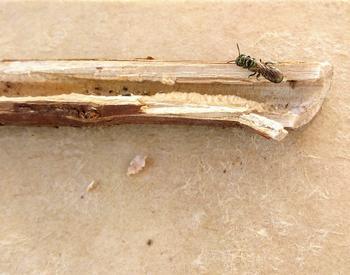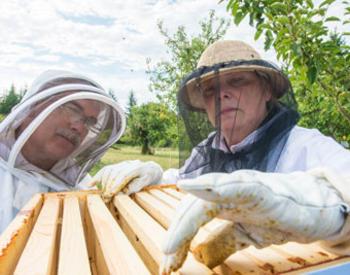Transcript
Speaker 1: From the Oregon State University Extension Service, this is Pollination, a podcast that tells the stories of researchers, land managers, and concerned citizens making bold strides to improve the health of pollinators. I'm your host, Dr. Adoni Melopoulos, assistant professor in pollinator health in the Department of Horticulture. Dear listeners, this week we're going to be talking about bees and communication, and not just the fascinating, intricate world of how bees communicate with one another, but also about how we communicate ideas about bees amongst ourselves in the big and complicated world that we live in.
It's really hard to think of somebody more qualified to talk on this subject than my guest today. From his first book in 1987, The Biology of the Honeybee, Dr. Mark Winston has been thinking deeply about the communication among honeybee nestmates at the lab that he led for many years was world-renowned for its discovery of the five-component pheromone blend given off by the honeybee queen from her mandibular glands. But as you'll learn in this episode, Dr. Winston has always had a real driving passion for communicating science to the general public. In fact, most of the six books that he's published have been focused on contentious issues that people deal with, like the risks associated with genetically modified foods or the use of pesticides in agriculture. He made a radical departure from honeybee research and founded Simon Fraser University's Center for Dialogue, which he directed for 12 years. Most recently, his latest book, Be Time Lessons from the Hive, won him the 2015 Governor General Literary Award for Nonfiction in Canada. On a recent trip to Vancouver, I caught up with Dr. Winston to talk about his reflections on 30 years since the publishing of The Biology of the Honeybee, but also looking ahead to his forthcoming new work titled Listening to the Bees. Dr. Winston is probably one of the most influential people in my own life, so I'm really excited to be bringing him to you today on Polynesian. This is a delight. A delight for me too. I'm sitting in the Center for Dialogue at Simon Fraser University in Vancouver with Dr. Mark Winston. Welcome to Polynesian.
Speaker 2: It's always a pleasure to Polyne.
Speaker 1: I really was remiss. I wish I had talked to you last year because it was the 30th anniversary of The Biology of the Honeybee, which is a remarkable book. I remember reading it for the first time in your class, Biology 427, the last class that you taught. Was that social and psychology?
That was Honeybee biology. I remember really being blown away because it was really readable, but it was comprehensive. Everything you needed was in there.
It also had these wonderful diagrams. Looking back, what was going through your mind when you were writing it? Did you have a specific audience in mind? What was the pretty remarkable undertaking? I was a little bit about writing the book.
Speaker 2: There were a lot of things going through my mind. I had originally thought of that book before I got my job at Simon Fraser University when I was applying for jobs, and nothing was happening. It occurred to me that, well, if nothing's going on, maybe I should write a book.
Then I did get a job, so I put it on the back burner for a while. Honeybee biology was inspired by a number of things. One was that course.
I was teaching a course in Honeybee biology for upper-level undergraduates, and there was no textbook. It occurred to me that we needed one. The book actually began from a series of notes that I had from our lectures. That was the skeleton, the backbone of the book. I was also inspired by a 1950s book by a British biologist named Ribbons. His book was called Honeybee Biology. It was just absolutely marvelous writing, up to date for that time. When I wrote The Biology of the Honeybee, of course, a lot of his book was outdated, but I think I had the imprint in my mind of this beautiful writing style that was comprehensive but also approachable. That was part of the imprint, I guess, that I had before I wrote it. I think I realized that there was a lot, even I, who was considered an expert on Honeybees, didn't really know about Honeybee biology.
Just a lot of really simple basic questions people would ask me, and I'd be stumped. The book was a way for me to research and fill out my knowledge about the bottom lines of Honeybee biology, the anatomy, development, behaviors, and all the things that put Honeybees together. All that stuff came together and became that book.
Speaker 1: You must have had a lot of comments over the years. People's experiences with the book, I know, are master beekeepers in St. Amore, again, read it, right up to when I was a graduate. Is it a very approachable book, at the same time being comprehensive? Do you remember any stories people told you of their experiences with the book?
Speaker 2: I don't know if I remember specific stories as much as this compendium of experiences. People still come up to me at meetings with a very dog-eared copy of biology that I'm going to be wanting me to sign. I do get that comment a lot that this book really meant a lot to me that it opened their eyes to bees, and that it was part of getting involved in bees, which normally people do from the beekeeping end. And even for beekeepers, this provides that understanding of the biology that makes the arts of beekeeping much more interesting.
So not one particular comment, but I guess more a range of interest. It still sells. It amazes me, actually. It's quite out of date, and people still come up to me saying they just bought it and a number of classes use it across the world. So it's had pretty good likes.
Speaker 1: You know, communication has been a key feature of your research. I mean, you had a very expansive research career, but honeybee communication, communication among estimates has been a central focus of yours. As you worked with honeybee communication, what have been some of the surprises, some of the things that you've stumbled across that have been kind of remarkable to you?
Speaker 2: The depth and breadth of chemical communication still boggles my mind. Working with my dear friend and colleague, who's Keith Lesser, who passed away a few years ago, was really illuminating about just how many chemicals there are that we don't know about in addition to the ones that we do know. I think there must be 40 or 50 already identified chemicals involved in honeybee communication, and that's probably just the tip of the iceberg. So there's this subterranean world of communication that we don't see or smell or hear, but it's absolutely critical to bees. And that's like most things with bees spilled over into my regular life and really understanding how poorly we humans communicate with each other, and how little we understand the different channels by which we interact.
And I think my interest in dialogue really grew out of that mystery of bees and how they create this incredibly cohesive society, communicating in modalities that we're just not tuned into.
Speaker 1: You know, I think it was about the time when I was a graduate student, I remember you really kind of shifting your attention to communication with this other organism, the general public. Do you, how do you remember that transition when you were, you know, had a very large bee research lab working on very complicated questions of honeybee communication and shifting your focus towards science communication? How do you remember that transition?
Speaker 2: I think I don't remember it as a, just a clear-cut moment, as much as just a very, very long series of developing interests. When you get interested in bees, you automatically become interested in agriculture. Agriculture has a lot of public issues, pesticide use, how do we farm?
Where does our food come from? And of course, all the issues are on pollination that are connected to that. I was in a pest management group in my department, which really exposed me to a lot of aspects of pests. And so I began to get interested more broadly in agriculture and in communicating with the public about the kinds translating that science to more understandable forms. So I began doing a lot of writing on pests, pest management, nature, a role in nature, and genetically modified crops.
And those are all issues that are of considerable public importance. And I think it was just step by step broadening the audience that I wanted to reach. However, I committed extremely early in my career to spend time with beekeepers. And beekeepers are the general public.
They are not by and large scientists. And so if I was going to hang out with beekeepers, I needed to learn how to communicate with them effectively. And I learned very quickly that beekeepers are way smarter than most scientists give them credit for. And it's not that they don't understand science.
It's that we don't communicate it well. So I would put a lot of time into figuring out how I could take complex science with a lot of jargon and turn that into more comprehensible forms. And of course, as soon as I did that, beekeepers would really get it and appreciate that. So I think that early work with beekeepers also set me off on a path of trying to find effective ways of communicating things that are not really as complicated as we scientists like to make out. They're actually quite comprehensible if we just step back from the jargon and figure out how to talk about it.
Speaker 1: Well, I'm sure some listeners remember your bee culture column, which ran quite a few years.
Speaker 2: 130 columns. One a month for probably close to 10 or 11 years. That was an experience. And that's compiled. You have a book of essays from that time, correct? I do. I just will know just my other books, but it's one of my favorites. It's called From Where I Sit, which is what my column is called. And it's just a lot of those essays gathered together in a book. But going back and reading those, I'm really happy with them. They went all over the map in terms of topic. They drew a lot out of my personal life, connecting the person with the subject of bees.
They liked the biology of the honeybee, or they were a great opportunity just to think widely and broadly without any limits about the full range of things that bees can bring into our lives. And I still get a lot of people coming up to me asking me when I'm going to start writing that column again. It had a small but dedicated following, I think.
Speaker 1: Well, I remember it was really remarkable because whatever topic you took on was quite generous and expansive. We were always difficult to pin down. But you also had an opinion and a position, and it was often provocative. So I remember a lot of times when I was in the lab, there would be discussions around some of the pieces because they were not a typical beekeeping column, how to, but more of a provoking thing.
Speaker 2: There are so many really large issues about who we are in the world that bees bring to us, that it's a shame to ignore those. I think that my perspective in that column was, let's think bigger. Let's really think about the broadest possible implications of what we're seeing here. And I would use the word thought-provoking more than provocative. My intention was never to poke people with a pin and make them angry, but more to ask us all to go deeper, ask deeper questions, and think a little more profoundly about what we're seeing. And if I could open that window to a deeper understanding, that I think the column was successful, I tried, hopefully mostly succeeded, at never being mean. I don't think there's enough meanness in the world without me adding to it. So it was sometimes a bit of a balance to write things that were thought-provoking, and that weren't seen to be mean-spirited because they might disagree with something.
And I hope, I think I found the right balance there of helping us to think through things without becoming personal about, it because I disagree with you, that means you're a total moron, tried to avoid that.
Speaker 1: Well, I remember, I'm just looking across a room here, I remember that when Nature Wars came out, I would grab the student at the time. And I remember what I really appreciated about the book is that there were multiple perspectives that you went out and saw.
And I think I remember you being at ESA meetings, sort of there with your notepad and talking to people and really trying to get them to fill out the whole picture.
Speaker 2: Yeah, I am a very curious person. I'm just really interested in stuff and talking to people in fields different than my own just fascinates me. And it's not only getting to know their field but just getting to know them. And all of my books have people in them.
And I think those people serve as a good vehicle for carrying a science story along with it. The other thing about Nature Wars that was part of this path I've taken towards spending more of my time with dialogue was that it won an award. It won the Sterling Prize for Controversy.
The interesting thing about the prize was it was controversial, not because it was on one end of a spectrum or another, but it was right in the middle. Pesticide companies were really ticked off at me because I wasn't really so positive about pesticides. Environmental groups were not happy with the book because I wasn't strong enough about being anti-pesticide. It was kind of in the middle taking what I hope was a balanced point of view. And because of that balance, I won a prize for controversy because it turns out balance is a controversial place to be in our society. And I really thought about that a lot. Also, in my subsequent book, Travels in the Genetically Modified Zone about GM Crops, I explored the whole issue of how controversies get played out in a very debate-oriented adversarial society. And those experiences really led me to much more of a dialogue-based approach from curiosity, trying to understand perspectives rather than necessarily trying to promote disagreement. Well, let's take a break and we'll come
Speaker 1: back and talk about what comes next. Sounds good. Welcome back. Now, Mark, you spent 12 years directing the SFU Center for Dialogue. And then in 2015, you wrote B-time Lessons from the High, which earned you the Canadian Governor General's Literary Award. Were you thinking about bees during these years of working at the center? Or did you kind of see writing B-time as a return to the bees from a different perspective?
Speaker 2: A little bit of both. When I left the bee world and closed my lab, I thought I was done with bees. I thought that was the end. And I should have known better because there were a couple of times right when I was leaving. When I found myself in odd moments bawling my eyes out, I got all of my scientific papers bound in this beautiful leather binder by quite a wonderful craftsman originally from England. And when he gave me those, when they were done, I remember going out in my car and sitting in the car and just crying because I'd been kind of blase about moving away from bees and I realized what I was losing. There was another time on national television when they were doing a documentary about me and my work with an artist, Agnitha Dick from Manitoba. And as part of this documentary, they filmed what I thought was going to be my last talk ever to beekeepers at the Eastern Apocultural Society. At the end of that talk, I said goodbye and again just completely broke down, which unfortunately or fortunately that one was nationally broadcast.
So people would get the learn that I cried. So I thought I was done. And for a number of years I was, but I found first I missed it. I missed the people. I missed bees. And then I started realizing that all the stuff I was doing in dialogue grew out of my life with bees.
It didn't just pop up fully grown. There were things that I had already been thinking about and ways of interacting that I had developed because of my association with bees and beekeepers. And coincidental with all this, bees started dying.
This was around when colony collapse hit and concerns about wild bees were becoming much more predominant. And I just felt I wanted to contribute back again. And partly to reconnect with that community, I started writing bee time. So it was a way for me to return to the bees. And since then I've been doing, I still do a fair lot of talks to beekeeping groups and write about bees. This new book is about bees.
And I think I've reconnected with the community, not from a research sense, but maybe from being the person who likes to promote and propose broader ways of thinking about bees beyond just the research.
Speaker 1: You know, I wonder, you know when I read some of, and it's been a while since I've read some of the first books you've written, and then trying to reflect on reading bee time for the first time. And I do wonder if there is a kind of different perspective. There is, you know, there are some chapters in bee time that are almost philosophical, which is, I think there was a more here of the set of facts I'd like you to sort of, I don't know if that's a fair assessment. Do you feel like you'd have a developed different kind of perspective on the bees? Well, you've already said this, but maybe you feel a little bit more specific about what that perspective is.
Speaker 2: I think very much, you know, I'm not in the day-to-day trenches of beekeeping and bee research. And so stepping back has given me an opportunity to figure out the bigger things that I may have learned from doing all that. And it's very much interacted with my dialogue life. You know, my dialogue world is very much one of public interaction, thinking about very deep controversial, difficult issues in a way that we can understand each other rather than fight with each other. And that's fed back on my experiences with bees in a very healthy way, I think, to help me see those experiences differently.
You know, in some ways it's always been there, but I certainly emphasize more things than I used to. The university has kindly created an archive for my papers. And in putting that together, you know, I had an opportunity to see letters that I wrote when I was like 15, 16 years old, see letters that I wrote when I was in South America doing research in my 20s, and connect with old journals that I used to keep.
And I was astounded that they were me. Like the same voice was there, maybe not quite as practiced, maybe not quite as experienced. Certainly younger, certainly dumber in a lot of ways, things that I didn't recognize. But I heard that I could really hear that voice in the old stuff that I wrote as much as today. So different emphasis today, but I think I've always been the same person.
Speaker 1: So you have a new book coming up in a few months with Renee Sakakar, titled Listening to the Bees. Tell us a little bit about that book.
Speaker 2: It's an interaction between a poet and a scientist where they became interested in my scientific research and began reading it and writing poetry from it, inspired by the language and some of the ideas. As I read her poetry, I became interested in writing some essays that reflected my perspectives on that research many decades later. Perspectives that were now much more flavored with an interest in public issues, issues around agriculture and environment, and the really profound, unknowable issues of, you know, who are we, why are we here?
There's a lot to be learned from Honeybees and I know about those things. And as we interacted, we started doing public readings as well. And we were having a great time. And I remember showing it to my wife, Lori, once, what we had written, not quite knowing what to do with it.
And she took it for a couple of days and she came into the bedroom one night with this look on her face. And at first, I thought, I don't know if somebody's died, but it was kind of a look like, this is brilliant. Like, yeah, you have to finish this. It's a book. And that was the first realization I had that Renee and I were actually writing a book. It's an interesting book because it doesn't fit any known genre. People write books of essays. People write books of poetry. But there are very few books out there that combine the two. So it's quite an experiment.
And we'll see how well it does. What prompted Renee to go back and read some of this old work of yours? Renee's always been interested in old things, old manuscripts. She's had a lifetime interest in bees ever since she was... When she was born in India, there was a Hindu ritual where grandparents put a drop of honey on her forehead. And family lore is they did that and a bee came and settled on Renee's forehead.
Wow. Which is actually something that's in a lot of different cultures, lures around saints and things. But it happened to Renee. So because of that lore, she was always interested in bees. And she's very attuned to words. And the jargon and entomology, which is impenetrable for most people, was incredibly exciting for her. Words like diapause and hibernacula and structures in the honey bee, the base of the stippital process.
And the labio maxillary complex. She would read those and just riff off on language. And so I think it was a mix of the words, her interest in bees and her interest in old things.
Speaker 1: All that language came from somewhere. And it is really, sometimes when you sit down and work through the etymology of some of these words, they're remarkable. But they also can be a real impediment to a barrier to people. So it's really great that she combined those interests and sort of motored through. And what's her work like? What kind of responses can we expect in the book?
Speaker 2: Oh, hard to describe. She takes the poems into directions that connect to the language, but also connect to what the research was about. Some of the poems connect to her own Hindu background bringing in some ancient Hindu history that's around bees.
So it's quite a mix. She's best known for a book called Children of Air India. It was a well-known bombing of an Air India flight many, many decades ago in which she lost a number of relatives. And just a couple of years ago, she decided to write a long poem about that, which got quite a bit of attention. So her poetry is all over the topical map. It's not just about bees for sure.
Speaker 1: And so she would write a piece and she would sort of sit back and think about it and write a response? Or how's the book structured?
Speaker 2: It was originally structured as a call-and-response where she would write something. I would write an essay in response, but that gradually broke down. And sometimes I would write an essay and she'd write a poem in response. We'd both go back to my original research and try to figure out what might be interesting in there to take into a book like this. So it became a very collaborative effort but with a lot of different modes of approaching the material.
Speaker 1: We started by talking about biology, the honey bee, and in some ways, this book is coming around. Do you think about that sometimes? That this is a kind of circling back or reconsidering something through different moments?
Speaker 2: Very much. I think a lot of my writing has tried to take different approaches with bees at the core, but approaching them in different ways to tease around the edges of these great mysteries that we will never understand. To me, bees are unknowable.
And I say that as someone who has done a lot of research and had a lot of students who helped us to learn more about bees. But the amount we know, compared to what we don't know, is just maybe symbolic of how little we're ever going to understand who we are in this world and what everything is all about. And I love that mystery. And so I felt that mystery ever since I opened the first beehive. And I think that element has been in everything I've written and is now more prominent. As I get older, I find myself reveling even more in the unknowable.
Speaker 1: When Listening to the Bees is going to be available when? That's something really I'm looking forward to.
Speaker 2: Available in Canada at the end of April at the United States at the end of June?
Speaker 1: Well, Mark, let's take a break and we'll come back. I've got a couple of questions for you. So we'll just go straight into it. So we do this segment on every show where we ask our guests the same three questions. I'm really interested in asking the first question. We ask people, is there a book that was really inspiring to you or do you want people to know about polymers? And I can imagine you're probably going through a large catalog in your head.
Speaker 2: Certainly, Ribbon's 1950s book, Honey Bee Biology, was incredibly inspiring.
Speaker 1: I think I remember getting it when I took your class, I think there were excerpts from it. Is it the one, there's like some in one another book?
Speaker 2: I probably Xerox pages of it because it was the only thing available at the time. So that was another incredibly inspiring book Maurice Mettrelink's, I don't know the name of it now.
I probably have it here in my office somewhere. The Life of Bees, Life of Honey Bees? Ribbon's book, Ronald Ribbon, is about the behavior and social life of Honey Bees. And connects the idea of sociality.
So that really meant a lot to me. Mettrelink's book is really about the spirit, the metaphysical, the philosophical, and the spiritual aspects of the hive, and has some of the best writing. There's some older writing by French philosopher Fabre, who is, an entomologist, that really inspired me. Not so much about pollinators, but E. O. Wilson's book, The Insects Societies, still sits on my shelf as a classic about social life. That was certainly an inspiration.
Speaker 1: Okay, great. Those are excellent suggestions. And I don't think anybody's suggested those in a good-year-odd episode. So thank you for some new suggestions for the listeners.
Speaker 2: Yeah, they're pretty old school, but you know, sometimes those old chestnuts are really well worth going back to.
Speaker 1: Well, I do remember reading Henri Fabre years ago. And the thing that I really loved about it was this kind of, you know, he was like a grade school teacher and then just retired early and then made these fascinating observations. I always loved that sense of discovery and exploration that was not restricted in any way, who just went out.
Speaker 2: I think that's something a little more characteristic, perhaps, of French science, is it does have a much stronger philosophical component. And in North America, we tend to be a little more mechanistic. I've always really appreciated my French colleagues because they like to sit around and have some cheese and wine and talk about bees in a way that we don't usually talk about them in typical North American scientific or beekeeping meetings. So I've always appreciated that.
Speaker 1: I think, oh, this you should take up cheese and wine.
Speaker 2: Yeah, talk to your dean.
Speaker 1: The next question we ask our guests is, is there a tool that you find really essential for the kind of work that you do with pollinators? A tool. Yeah.
Speaker 2: Yeah, no, in terms of a tool, I'd have to, because I'm a writer, this is writing has become the core element of what I do now. And I'd have to say everything associated with writing.
I could say my computer was the tool. But I think it's all the ways we can communicate about bees. I write about bees. I do a lot of speaking, a lot of interviews on TV and radio and newspaper. I think that those communication tools are the way I approach pollinators and with the hope that by communicating about the glory and the plight of all of our pollinators, maybe we can make a bit of a difference in their future. So I'd say writing communication tools were my that's instead of the hive tool. That's what's in my pocket right now.
Speaker 1: The last question I have for you, and again, this has been interpreted broadly. Do you have a favorite pollinator? So here's an example, some people have said my first package of calling package bees and other people have, you know, they, there's a bee they saw years ago that just really fascinated them. Do you have a favorite?
Speaker 2: Yeah, no, I'm really going to have to go with the honeybee. As my career progressed, we did more and more work with wild bees, but I don't know. I bonded with wild bees as a concept and as a totality, but there's no particular bee that really jumps out at me. But so much of my career, so much of my life has been spent in a beehive, you know, going to the bees and, you know, it's morning, maybe it's just dawn.
It's a little, little bit of doing the air and you like the smoker, you lift the lid of the hive, take out that first frame. I think those moments still stick with me and I'd have to put the honeybee as my pollinator of choice at the moment.
Speaker 1: So many people point out that honeybees are very weird amongst the bee fauna in North America. And but that experience, I have to say, having done native bee work, just the smell of a hive, the smell of old hive equipment, you know, there's a thing about it that is really, is a very different experience. And it's a, it's really wonderful.
Speaker 2: Yeah, it's a full-body experience. And I say that with all respect and understanding for the importance of wild bees. I am certainly not one of these people who says honeybees forever, wild bees don't matter. If I had me, if I had the opportunity, I would actually switch pollination around and make wild bees the managed pollinator of choice rather than honeybees.
I just don't think it's good for honeybees or for our agricultural system to be so reliant on an insect that we have to truck, you know, sometimes thousands of miles to put them to work. But I think because I'm very social, and I'm just riveted by social interactions between bees and between people the sociality of bees and their collaborative nature, their intense communication, their work ethic, the way that they put the hive before themselves. I don't know if those attracted me or formed me. Maybe it's a mix of, it might be a mix of both. But the honeybee is, it's the one that's in my heart.
Speaker 1: Well, it's been a real pleasure. Thank you so much for your time, Mark. My pleasure. Thanks so much for listening. I'll see you in the next video. Thank you.
Mark Winston was the recipient of the 2015 Governor General’s Literary Award for Nonfiction for his book Bee Time: Lessons From the Hive. One of the world’s leading experts on bees and pollination, Dr. Winston is also an internationally recognized researcher, teacher and writer. He directed Simon Fraser University’s Centre for Dialogue for 12 years, where he founded the Centre’s Semester in Dialogue, a program that creates leadership development opportunities that equip and empower students contribute to social change in communities.
In this episode Mark reflects on 30 years since the publication of his first book “Biology of the Honey Bee” (1987) and the forthcoming release of his latest book with Renée Sarojini Saklikar “Listening to the Bees” (2018). He discusses how communication (both within and beyond the hive) has been a thread through his work.
You can Subscribe and Listen to PolliNation on Apple Podcasts.
And be sure to leave us a Rating and Review!
“For a number of years I was [not working with bees], but I found first that I missed it, I missed the people, I missed the bees, and then I started realizing all the stuff I was doing in dialogue grew out of my life in bees“. – Mark Winston
Show Notes:
- Mark’s reflections on writing “Honey Bee Biology” in the mid-1980s
- Mark’s work the role of honey bee queen mandibular pheromone
- How to write in a way that is accessible to a broad audience
- Mark talks about his long-running column in Bee Culture magazine
- What has remained the same and what has changed around Mark’s thinking about bees.
- What inspired Mark’s newest book “Listening to the Bees” (2018)
- What is so unique about the format, style and writing in “Listening to the Bees”
“To me bees are unknowable, and I say that as someone who has done a lot of research and who has had a lot of students who helped us to learn more about bees“. – Mark Winston
Links Mentioned:
- Learn more about the books of Mark’s that he talks about in the episode:
- Winston, M.L. and Saklikar, R.S. 2018 “Listening to the Bees” Harbour Publishing.
- Winston, M.L. 2014. “Bee Time: Lessons from the Hive.” Harvard Univ. Press
- Winston, M.L. 2002. “Travels in the Genetically Modified Zone.” Harvard University Press
- Winston, M.L. 1998. “From Where I Sit: Essays on Bees, Beekeeping, and Science.” Cornell University Press, Ithaca, N.Y.
- Winston, M.L. 1997. “Nature Wars: People vs. Pests.” Harvard University Press., Cambridge, Mass. 2003.
- Winston, M.L. 1987. “The Biology of the Honey Bee.” Harvard University Press
- Mark talking about building community through dialogue.
- Check out Mark’s favorite books about bees:
- Mark’s favorite tool: communication
- Mark’s favorite pollinator: the communicative honey bee
- Connect with Mark L. Winston at his website.
- Mark Winston’s presentation at Sam Sullivan’s 25th Public Salon.
